#dr who analysis
Text
Doctor Who The Star Beast Review
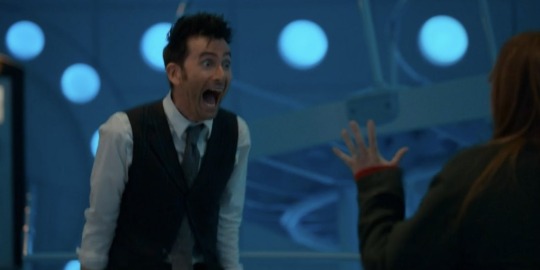
I liked the first doctor who special. I loved seeing the Noble Family, I ADORED the Meep and the new gorgeous Tardis. The aliens felt like drwho aliens without having horrible CGI (yes I love it too but let's be real). I looooved all the references: the Temple Noble line, the mentioning of Nerys, the wig moment as an homage to classic who, the fact that Donna's daughter chose the name Rose, all her plushies of the drwho aliens and so on. David and Catherine's chemistry is unreal, they are their characters it's insane...they have always been my favourite duo and having them back is a gift and it makes me so emotional so I don't feel like complaining at ALL...but there are still some things I didn't love.
I liked that the trans storyline is a big part of this episode but personally I appreciate it more when certain topics are explained in a more natural way but then again, there are people who don't get it and the show is now on disney plus so I guess they handled certain topics it in a way that could resonate to a larger target audience. I loved that the fact that she is trans is not the first thing we learn about Rose, we find out in a very normal way and I liked the pronoun conversation because it felt very real, what I didn't really like was the binary/non binary parallel of donna's line, it didn't really work for me it felt a little strange.
What I didn't like at all was the "a male presenting time lord could never understand" line because no...I will do a separate post about it because the problem is not the intention behind Donna and Rose's actions...it's the line...that line is an absolute no.
That being said DrWho is back and I am curious to see what will happen next. I am not too afraid of the idea of a new era, I'm happy that now that it's on disney more people will know about it and love it. When you change platform it is expected to have some changes and to be honest who cares, it's great that doctor who wants to be different for new fans and I am curious to see how it will move forward. Right now it feels nostalgic but it's when we'll say goodbye to David and Catherine that we'll actually see how this new direction is affecting the show. For now I'm really excited about the other specials, I can't wait to sob when I'll see Wilf.
#doctor who#drwho#dr who fandom#doctor who special#dr who analysis#david tennant#catherine tate#14th doctor#the star beast#whoniverse#rose noble#the meep#russel t davies#tardis#doctor who review#doctor who analysis
14 notes
·
View notes
Text
Some of you ship tedbecca, tedtrent, and/or roykeeleyjamie and was extremely disappointed that none of them set sail in the finale but none of you will ever understand the pain of my otp not happening,
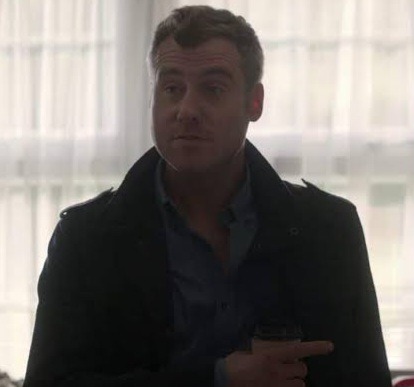
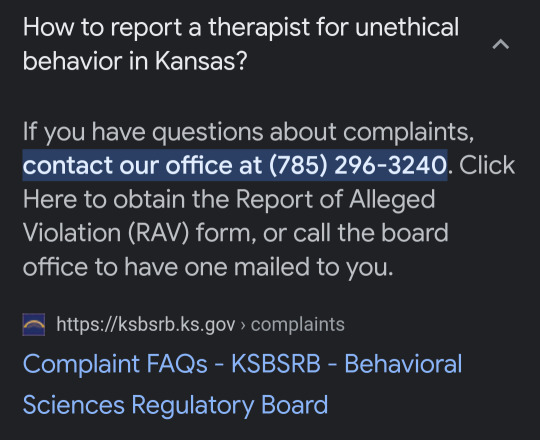
Dr Jacob X Being Reported/Losing License
#Dr Jacob x Losing his License deserved justice!!!#ted didn't want to meddle but buddy u cant tell me u trust someone who manipulated/preyed on your baby mums?#he told u to make space and then conveniently filled that space??#this isnt a 'my ex-wife business' this is a 'my family business' and u need to protect your VULNERABLE baby mum for your son's safety!!#ted lasso#ted lasso analysis#tedependent#tedtrent#tedbecca#roy x jamie x keeley#roy x keeley x jamie#reelie
3K notes
·
View notes
Text
“But We Love Martha Jones!” - The Doctor Who Fandom’s Selective Memory of Racism
Be aware that this article contains explicit examples of anti-black racism and misogynoir.
**Contents**
Intro
1. Everybody Hates Martha
2. Utopia-ish
3. Martha vs Bill
4. Martha Triumphant?
Intro
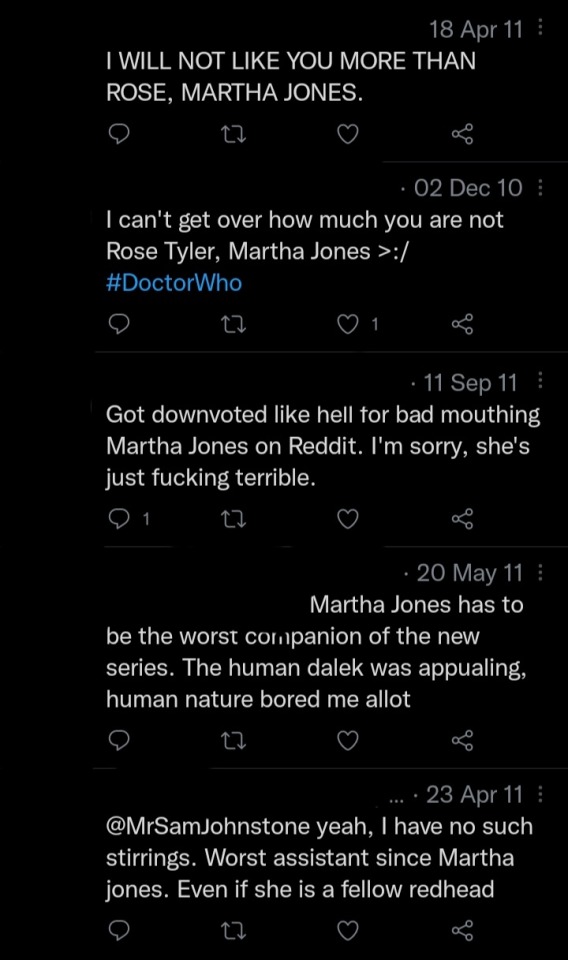
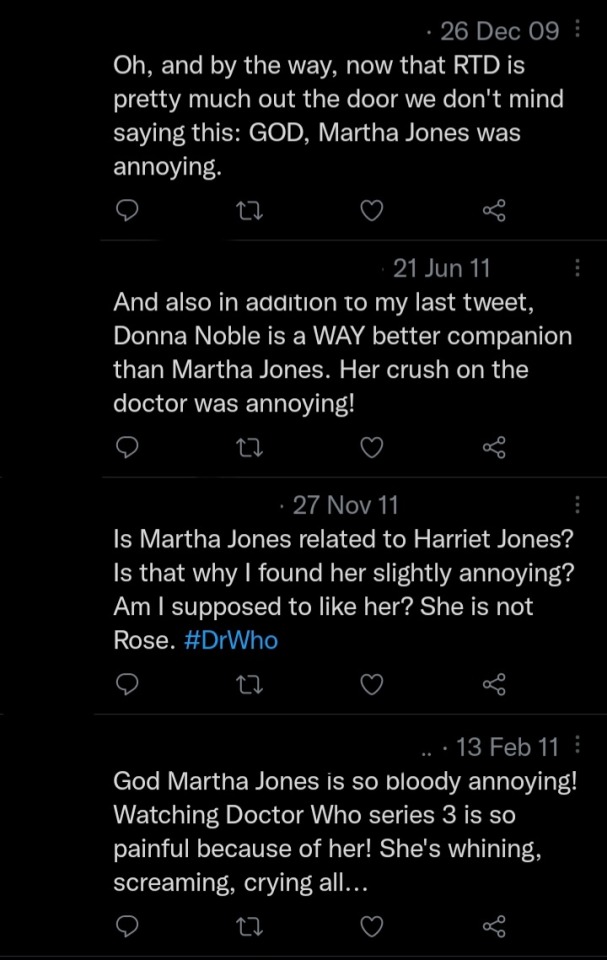
To say being a Martha Jones fan from 2007-2017 was hard would be an understatement. The fandom claimed she was too clingy. Too jealous of Rose. Too bitter. Too bad a companion. For as long as I can remember, Martha Jones wasn’t just an unpopular companion - she was THE unpopular companion. So this recent increase in “my issues with [insert companion of colour here] isn’t about race. Everybody loved Martha Jones!” has me raising an eyebrow. Freema Agyeman as part of Ofcom’s Diversity In Broadcasting Event answered a question on her time as Doctor Who’s first Black companion. She describes her time as “good and bad”. She handled the criticism of Martha as a character “but the racism… yeah, yeah couldn’t rationalise that” as she pauses in the video. In the silence we get a clear answer - Freema Agyeman did not have an easy time as Doctor Who’s first Black companion. So when I see comments about how much she was loved, or how no one knew what Freema was going through when speaking out about the racism she experienced, or “My sus posts about Ryan & Yaz aren’t racist! I loved Martha!” I, and many other Black/mixed Black fans and other fans of colour have bad tastes in our mouths. We remember the real history of how Martha Jones was treated - and her history wasn’t a kind one.

Chapter 1 ->
#martha jones#freema agyeman#doctor who#new who#doctor who fandom#doctor who analysis#dr who fandom#dw fandom#fandom racism#rtd era#rtd critical#fandom analysis#fandom history#fandom colourism#black representation#rtd#rtd1#fandom antiblackness#antiblackness#colourism
324 notes
·
View notes
Text
Let's bust a popular myth!
David Tennant was NOT filming the upcoming Dr Who specials while also filming GO season 2!
Good Omens s2 filmed from Nov 2 2021 - Mar 1 2022; the Doctor Who specials filmed May 3 - July 25 2022.
So... what's with Crowley's s2 shifting sideburns and tattoo? Everything is meant. (And if you're not sure about the crew's over-the-top attention to detail, please read this post about the antique sink recreation.)

(pics above, all from s2: "oh no, it's not like that", the love confession, and planning to do a half miracle each)
It seems like Dr Who could be an easy excuse to mask s3 hints hidden within s2...
Here's the first theory/analysis I've seen, by @f0ul-f13nd. What do YOU think??
Have some more pics to study:

(pics above: before the beginning, s1 wall slam with subtext, s2 watching the awning of a new era)

(pics above: lots of angles and both sides of his face during the s2 love confession and kiss)
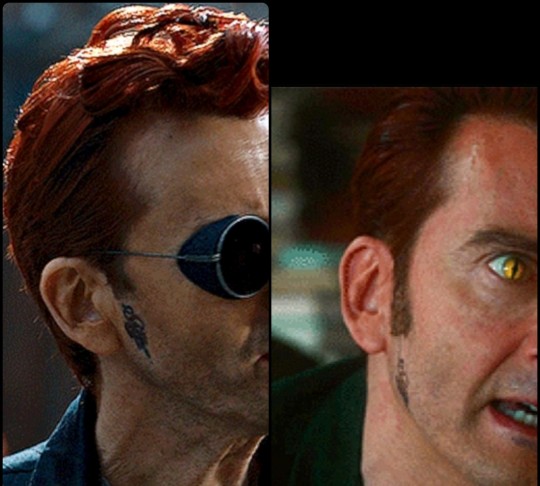
(pics above, from s2: learning about Azi's French lessons, threatening Jim!Gabriel)
And don't get me started on his multiple wigs and headbands during Job, or his trimmed mausoleum mutton chops. (Details with links are filed under "inconsistencies" in my pinned collection of Clues and metas, if you want them!) There's at least one unreliable narrator at play here, but the question is WHY? WHO? WHAT does it MEAN??!
Someone should ask Neil, PROPERLY! (I'm teasing, with the utmost admiration, please don't actually ask him! No magician is going to reveal their trick in the middle of their act.)
Interested in diving further into all the Good Omens mysteries? I have lots more of my own posts plus Clues and metas from all over the fandom, here.
#good omens#unreliable narrators#good omens meta#crowley good omens#crowley's hair#Crowley's sideburns#Crowley's tattoo#clue with a capital C#good omens season 2#renew good omens#good omens analysis#david tennant#dr who
397 notes
·
View notes
Text
dr ratio vs. the genius society | an analysis
this'll also be a comparison between ruan mei and dr. ratio so warning for that one too, just in case.
i saw this post by @chronical-lover
and firstly, i just want to say thank you, especially about mentioning how aeons don't care about humans because youre so right. i wanna expand a little bit on the comparison between his character and the genius' that we've met this far.
ratio ultimately failed to be recognized not because he wasn't smart enough, but because he was too human. he's human first, scientist second. he'll always be human first, he doesn't have it in him to act without emotions no matter how much he wants logic to dictate his every move. his entire character is that he believes every one has a human right to be alive, to learn and to grow. he's there to guide them, not necessarily in the nicest way, but still.
i think contrasting him with ruan mei in the story quest was a perfect idea. when you meet ruan mei, she's kind. she makes the trailblazer feel comfortable, even for just a little bit. she offers companionship, tea, and a conversation. but she does not care about the trailblazer or her creations, something painfully obvious in her actions. when the trailblazer was facing up against ruan mei's failed attempt to make a replica of the emanator of propagation, ruan mei was no where to be found. but you know who was, just in case he had to step in ? veritas ratio. even though both knew that the replica wasn't likely to hurt the trailblazer, ratio was there.
" since you're here, i won't intercede. but should you fail, i will be forced to prevent some avoidable misfortunes "
( i hate this man so much )
but he was there. he witnessed the fight, and once the threat was over, it was time to get going ( his words, not mine ). he was there to witness you fight, and should he had needed to, he would've stepped in to prevent us from any actual danger. however, when we approach ruan mei after the fight, and we look reasonably upset from her, we don't get an actual apology. she says she regrets her actions, but her words aren't actually about putting us in danger. she was upset that her experiment fell short, that she had made another predictable outcome.
" you look.. upset, correct ? i regret my actions. there's no defending what i've done. time and again, my experiments have fallen short, and they've always yielded predictable results. i made a clone but it.. doesn't hold a candle to the emanator. "
she did say that she would be there if the danger proved to be too great, but she was not. veritas, however, was. both of them said that they would step in if needed, but only one of them was actually in a position to do so. only one of them took preventative measures to make sure that you were safe from harm. and that is not the genius ruan mei, no matter what her words say.
ruan mei has a flowery way of speaking. not to say that she necessarily minces her words, she's upfront about a lot of things. but she lures the trailblazer into a false sense of security. she's introspective, and questions her own actions a lot. but she's never apologetic about the way that her actions put other people in danger, just that they don't yield the results she wants.
ratio, however, is curt. we meet him originally as a brooding, mysterious figure. he's mean, he doesn't use a lot of words to get his point across. he says what he means, and he's a fan of effective communication. he doesn't have to worry about himself, he knows who he is and how is actions affect himself and the people around him, and that leads to people assuming that he's egotistical ( which he might be , a little bit. as a treat ) but the reality is that ratio cares more about the people around him that he'll ever let on.
and that's where he fails. that's the fundamental difference between him and those within the genius society. ruan mei, herta, screwllum, and the other geniuses do not care about anything other than results. and yet ratio is kind. he's inherently kind, his actions are all for other people. he's saved a dozen worlds with his inventions. he's a scholar within the intelligentsia guild, and a doctor saving his patient's lives every single day. he wants to guide people from the shadows towards the right answer, he wants to make them use their brains and think.
he does not act without considering other people. he can't be a genius first, and a human second. and that's where he fails to gain nous' recognition. it's not that he's not not intelligent enough to be a genius, it's that even in his pursuit of knowledge, he has not forgone his humanity.
and perhaps, in nous' eyes, that's the difference between the mediocre and the genius. to erase every part of you, your emotions, your empathy, your humanity, in the pursuit of knowledge is what separates a genius from the masses. not having those barriers allows you to really dig deep into subjects that would otherwise be considered taboo or dangerous, because you don't care about how the outcome affects people as long as you can study it. as long as you can get answers out of what you're studying, it doesn't really matter what the test subjects are feeling.
ratio is too human, too caring, to ever be considered a genius in nous' eyes.
#dr ratio#honkai star rail#honkai sr#star rail#dr ratio hsr#veritas ratio#genius society#ruan mei#herta#hsr#screwllum#analysis post#character analysis#media analysis#discussion#i think he's too kind#kind in the sense that he will care about your wellbeing in a very#ratio way#i love him#and it makes me irrationally angry when people write his character off as a narcissistic asshole#because hes far from it#sorry you cant take a character who doesnt dance around the subject
95 notes
·
View notes
Text
Poison Ivy & Red Hood Parallel: Thoughts On Murder
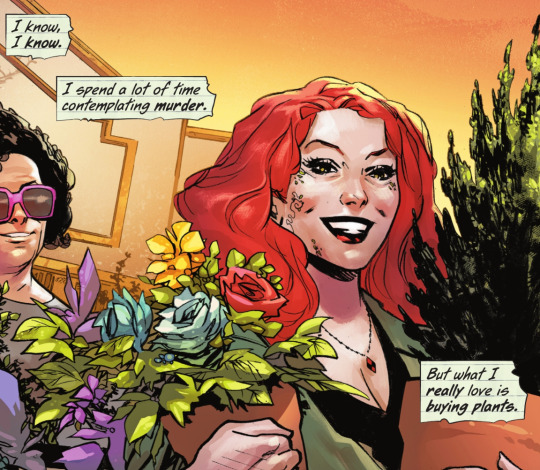

#dc#dc comics#comics#comic books#poison ivy 2022#joker the man who stopped laughing#g willow wilson#matthew rosenberg#parallels#character parallels#poison ivy#dr pamela isley#red hood#jason todd#character analysis#jason peter todd#pamela lillian isley#jason todd wayne#pamela isley#media analysis#comic panels#batfamily#batkids#rogues gallery#batman rogues#batfam#batman rouges gallery#comic analysis#funny
104 notes
·
View notes
Text
Doctor Who and Aziraphale's Bookshop: a Crossroads Through Time
We're not saying that the setting of the Doctor Who episode Silence in the Library/Forest of the Dead has anything to do with the design of Aziraphale's bookshop - from the dome skylight and the central columns, right down to the magic circle on the floor - but it DOES, right?
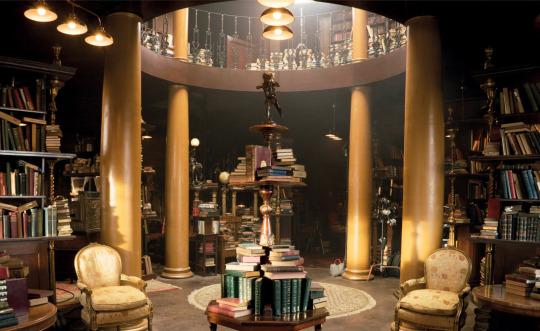
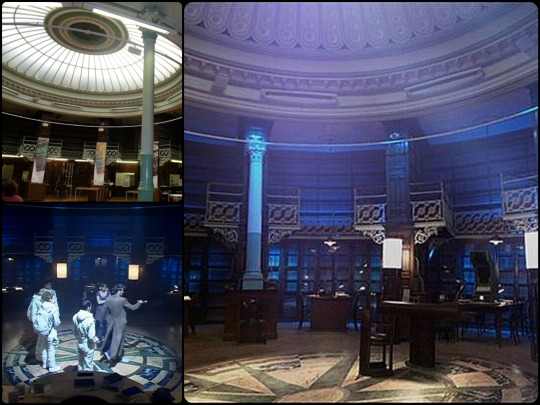
Welcome to the Round Room, which was once part of the Swansea reference library in Wales. "the room is quite extraordinary. The dark wooden panelling, the gallery with the high dome above, and the magical pattern on the floor all combine to create a dramatic, but mysterious ambience." "The gallery and the wooden pillars are edged by an intricately patterned and scrolled, white metal balustrade."
The Doctor Who episodes set in this library tell the story of thousands of people trapped, without their knowledge, in a life-saving virtual simulation that they believe is real and experience like a dream, skipping from moment to moment without experiencing time as a steady flow.
Are there parallels in not only the setting, but also the stories, of Good Omens and Silence in the Library? Here's a quote about how Aziraphale’s shop is built on a crossroads:
“I designed it on a crossroads because I felt that Aziraphale was [at a] crossroads through time”, Production Designer Michael Ralph tells Den of Geek. A crossroads is a “place of pause, so you don’t know which direction to go in”. [link]
A crossroads through time. A place of pause.
Is there something strange about Good Omens' time? For sure. Is season 2 happening within a time bubble or virtual simulation while time outside the bubble is paused in 2019? Maybe. What do you think?
Featuring contributions from the lovely members of the @ineffable-detective-agency, including @thebluestgreen @theastrophysicistnextdoor @noneorother @maufungi @kimberleyjean @ghstptats @embracing-the-ineffable and @bbbitchvibbbez
And with special thanks to @portraitofalonelydyke, for the post which inspired us to write this up! If you're interested in whether the center of the bookshop might be on top of the mysterious peak everyone is climbing towards in the s2 opening credits, please check out their post!
Find more of our posts plus clues and metas from all over the fandom, here!
#ineffable mystery#wibbly wobbly timey wimey#good omens timeline#ineffable detective agency#good omens clues#aziraphale's bookshop#dr who#silence in the library#good omens meta#good omens analysis#good omens speculation#good omens#aziraphale#crowley#doctor who
40 notes
·
View notes
Text
It’s just that like. Dr who being poorly written is not at all unique to the 13th doctor. And her seasons are not poorly written in a particularly remarkable way. So I do think it’s a bit weird that enjoying Girl Doctor Seasons is the sin that gets you labeled a Dumb Opinion Haver by much of dr who fandom.
And don’t give me “Chibnall is more conservative than other writers” unless you can defend to me why Chris Chibnall’s clumsy attempts at progressivism are Worse politically than some of the outright conservatism and bigoted caricatures we’ve seen with other writers (I am LOOKING at classic who fans who take a moral high ground about Chibnall’s writing while reblogging gifs from The Two Doctors).
Kerblam is One Episode and if you can call Chibnall era fans anti-worker and pro-capitalist for an episode he didn’t write then surely Kill the Moon’s existence is damning to anyone who enjoys Steven Moffat’s writing. Come on now.
It’s SO INFURIATING how classic who fans get the grace of other fans taking as a given that they are aware of the ways it’s flawed and choose not to focus on that but if you like girl doctor you must PROVE that you’re Smart about it and know that it’s bad, or it’s assumed that you Don’t Know or Don’t Understand What Good Media Is. I just don’t think we put other eras of dr who under nearly the same scrutiny as 13 gets. Dr who HAS been bad before and will be bad again and in some ways is Always Bad so it’s WEIRD to me that these seasons specifically are the ones that get the “I judge anyone who likes it” treatment from even progressive factions of this fandom. That other post is right it does remind me heavily of Star Wars fans who give the prequels little to no scrutiny and insist that the sequels are unforgivably bad. I will remain a Girl Dr Who and Girl Star War enjoyer. Sorry.
#discourse#do I main tag this.#doctor who#vent#?#kind of#did you guys know that there’s a whole community out there of people doing scholarship about dr who#and they almost Never care about whether dr who is Good or Bad. because those words close off more interesting analysis#I do think dr who fandom can learn many things from academia. this is one of them
58 notes
·
View notes
Text
Rewatching both House and ER and I have been thinking about why I find House to be a far more sympathetic character than Robert Romano.
To be clear: I know House's behavior is horrible. He should have been fired. There is no moral justification for his actions. However, as my favorite history professor constantly says: "context is not justification."
Words vs. deeds: House says a lot of terrible things, but his actions paint a different picture. He says antisemitic nonsense, but it never alters his attitudes towards Taub, Wilson, and Cuddy. He says he will sexually harass Cameron and Chase, and definitely does sexually harass Cuddy--but he never touches them without permission, and doesn't want to date an employee even when Cameron really wants to date him. Romano, on the hand, engages in verbal sexual harassment, and then does act on it. He tries to get Elizabeth deported because she won't sleep with him. He tries to get any out lesbian fired.
Backstory: House is the main character of the show titled House. As such, though we don't learn a lot about him, we are provided insights into his past. A big part of helping viewers empathize with a character is helping them understand why he is like this. You get a sense of House's tragic backstory, and how that backstory forged him into the kind of person he is. Romano, on the hand, is never fully expanded on. All we really know about him is that he has a good relationship with his mother. There isn't enough data to understand, and thus connect, with his overall character. He was intended to be a villain, rather than an anti-hero.
Self-reflection: House is a terrible person, and he knows it. He hates it. When he talks about the world with patients (I've noticed this particularly in season 1) he sounds really fucking sad. He wants the world to be better, he wants to be better, but this is how the world works and therefore he can only present himself one way and stay safe. This self-knowledge makes him a more conflicted character, and shows he has empathy. He wants to change, but doesn't think he can. On the other hand, Romano is deeply arrogant, not superficially arrogant. He thinks he's the shit. He truly believes he is the world's greatest man and entitled to act however he wants to the "little people" as he calls them. This removes a certain depth from his character.
Show tone: House is a show about terrible people. Everyone is crazy in their own unique ways. The show is about looking at the good in those terrible people. In order to enjoy the show, you have to stop yourself from analyzing the morality of the characters' actions. ER, on the other hand, is at least supposed to be about good people (don't get me started about how the protagonists treat Kerry, and whether that actually makes them good people). People are supposed to be heroic. The characters face deep ethical dilemmas the audience is supposed to consider. This makes Romano's heinous actions stand out and force the viewer to analyze them.
Pain: House is in pain. He is in pain all the fucking time. When people are in pain, they are less patient, more likely to snap. There's a standard view that when people are in a huge amount of pain, they say things they don't mean. They try to hit people where it hurts because of how much they hurt. This doesn't excuse his actions, but does create further separation between House's words and his innate character.
Anyway both ER and House are good shows, but suffer from being from the early 2000s (or mid-late 1990s in ER's case). You should watch them! But yeah, Romano bothers me way more than House, who I think would be an interesting foil for Kerry.
#house md#hatecrimes md#er tv show#er#gregory house#robert romano#character analysis#television analysis#character comparison#This is not to say anyone who likes Romano should feel bad about it#People are allowed to like immoral characters!!!#I know he has a following of people who sometimes find him amusing and that's all good#He definitely has his moments#I always laugh when Dr Greene gets into a fistfight and Romano enters and addresses him with “The lean Greene fighting machine!!!”#I'm just analyzing my personal character feelings
22 notes
·
View notes
Text
I haven't finished the book yet but the brutal irony is that Defarge's commitment to "justice" for Dr. Manet's wrongful imprisonment actually leads to keeping Dr. Manet in that prison, mentally. The age-old wrong was righted when Dr. Manet overcame his bitterness with the noble family that stole 18 years of his life so his daughter could marry their descendant and be happy. He righted the wrong with love and forgiveness. Then the French Revolution, in the name of "righting wrongs," came along and would've undone all the freedom Dr. Manet was experiencing by insisting on lopping his son-in-law's head off. They cry "Justice for the prisoner of the Bastille!" But the second they decide to carry that "Justice" out, poor Dr. Manet is so devastated, where does he go? Back to his mental prison to "make shoes."
"Justice" done in the name of "revenge for oppression" was not true justice 232 years ago, nor was it justice 172 years ago, nor is it justice today.
That's the truth we're reminded of, ladies and gentlemen
#spoilers#but like#it was published 172 years ago so come on catch up#a tale of two cities#Sydney carton#all y'all who were forced to read this in school probably already made this observation#but whatever I'm late#Charles dickens#Charles darnay#Dr Manet#Lucie Manet#Doctor Manet#classic literature#literature#literati#literacy#analysis#storytelling#racism#yeah I said it#classism#oppression#social commentary
23 notes
·
View notes
Text
you know, I really do think Vincent And The Doctor is one of the best episodes of doctor who.
I remember when I first watched it-I was around 13, depressed, grappling with the newly discovered gender dysphoria,the whole package-and I remember being disappointed about the ending. van gogh still ended up dying, i thought. he still ended up killing himself. so this whole thing was useless.
but as I thought more about it I realised that that's Not The Point. not only would it not make sense, what with time travel and trying to limit impact you cause on history and all of that-but it was just never about that, it was never about trying to change the ending.
van gogh killed himself. that's what happened. and no amount of whimsical time travel or sci fi antics can just magically zap mental illness and pain away, that's not how it works. but that's not the point. a difference was still made, even if it didn't affect the ending. he still killed himself, yes, but that doesn't mean it was all pain. joy was still found even in the middle of mental illness. he still painted those sunflowers.
I'm older now, and while I'm still depressed I've learned how to deal with it better. and I better understand what the message of the episode was. The good things don’t always soften the bad things, but vice versa, the bad things don’t necessarily spoil the good things or make them unimportant. and sometimes, adding onto the pile of good things is all you can do. but that's alright, because it's enough. it matters.
#tatan speaks#long post#doctor who#vincent and the doctor#dr who#ME?ACTUALLY WRITING SERIOUS ANALYSIS? its more likely than youd think!
39 notes
·
View notes
Text
“But We Love Martha Jones!” - The Doctor Who Fandom’s Selective Memory of Racism
Chapter 1 - Everybody Hates Martha
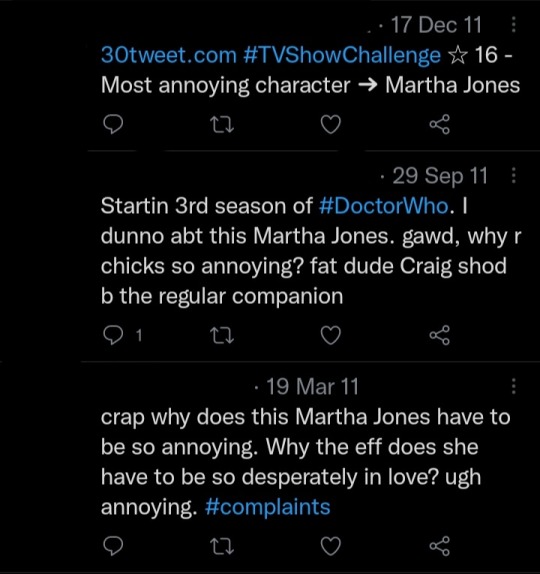


Contrary to now popular Whovian belief, no, the fandom didn’t like Martha at first. In fact, most Martha praise wouldn't come until years after her exit. The issue came from the “Rose shadow” of RTD1. Rose’s traumatic exit hit Ten like a truck and this echoed throughout The Runaway Bride. The episode beautifully covers the stages of grief; his denial as he forgets he can’t have another Christmas on the Powell Estate; his anger at the Racnoss; his bargaining as he reminisces good times with Rose; his depression knowing her can’t get her back and eventual acceptance - ending the episode with a solemn “her name was Rose”. On paper, this was the perfect closure Ten needed for Rose and a lovely way to say goodbye to her even in her absence. But her shadow still covered the rest of S3 and S4. And not in a good way.
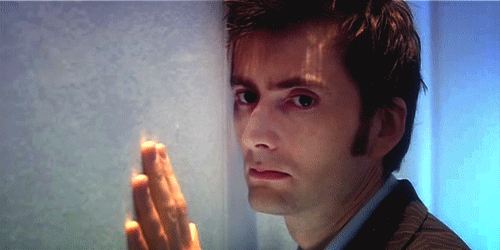
From the jump Ten tells Martha she could never replace her but mind you, Martha never claimed she would, but the fandom acted like she did and was. Her presence is mentioned throughout S3: the “not that you’re replacing her” in Smith and Jones; the “Rose would know” in Shakespeare Code; Ten taking Martha to the New New York slums in Gridlock when Rose got “glitter and cocktails”; the ink drawing of Rose popping out of Ten’s subconscious through John Smith in Human Nature/Family of Blood to Jack and Ten’s convo about her in Utopia to even the Master in Last of the Time Lords, calling Martha useless for not absorbing the Time Vortex like a certain companion. Can you guess who she is? Martha to this day is the only companion to be treated as the rebound to a previous companion and this bled into the fandom. Despite Donna’s growth in Partners in Crime working so well because of her growth after The Runaway Bride, it was still a common sentiment to “wish we went straight from Rose to Donna”. The S4 writing didn’t help Martha’s case either. Ten tells Donna about the crush and other “complications” while conveniently leaving out the mixed signals he sent to her. Plus, he admits his mistakes to well… Donna, and not to Martha’s face despite sharing three whole episodes with her. Martha spent those episodes being a host to a Sontaran clone and being kidnapped by the Hath so the “I’m sorry for underestimating you and comparing you to my previous companion, Martha Jones” never came out of Ten’s mouth. The show’s insistence on Martha as the “failed Rose replacement” gave the fandom great excuses to attack her and welcome a mountain of bad faith criticism that haunts Martha Jones discussions to this day.
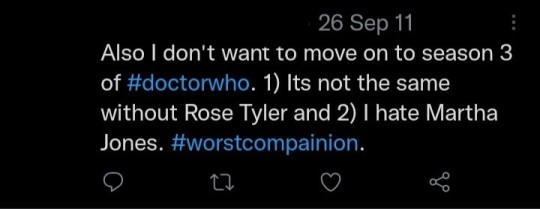
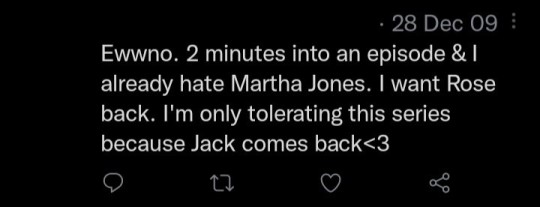


It doesn’t matter Martha saved the Doctor with CPR in her debut episode, used the Gamma Strike to defeat the pig men on the spot, saved John Smith, Joan and the rest of the village from the Family of Blood despite how racist they all were towards her, came up with the right word to banish the Carrionites on the spot, got the DNA sample needed from Lazarus and distracted him for Ten, got the 42 crew to dump the sun particles in the fuel, warned Ten about Yana’s watch and most importantly, stayed alive in one of humanity’s most hellish years to restore the Doctor and defeat the Master - she was incompetent.
It doesn’t matter Martha never attacked, belittled or actually insulted Rose but was rather tired of being put down for her instead, or the fact Rose within minutes of seeing Martha said “I was here first” and “Who is she?” with disgust - Martha was jealous and bitter.
It doesn’t matter Ten kissed her for a DNA sample despite her cheek, forehead and hand being available, knew about Martha’s crush and still acted oblivious post-Smith and Jones, hugged her then blamed her for said hug, lied to her about Gallifrey but told Rose the truth in her 2nd episode, called her a novice and literally screamed in her face in Utopia - Martha 100% to blame for the failed TenMartha friendship but not our unproblematic fave Ten.
It doesn’t matter Ten was willing to protect and travel with Donna in The Runaway Bride minutes after losing Rose and Eleven having no issue welcoming Clara after watching another version of her, Amy and Rory die in front of him - Martha had to be belittled by Ten because of grief.
It doesn’t matter Rose and Donna, then Amy and Clara in the Moffat era would need supernatural intervention to gain their titles, or that Rose and Donna needed Ten’s help a few times in their series - Martha had no agency.
It doesn’t matter Ten fell in love with Rose, Madame de Pompadour, Joan Redfern, Queen Elizabeth I, River Song, Astrid Peth AND Lady Christina, or RTD1’s insistence of (heterosexual) romance being the most human trait of humanity (which is a whole other conversation) - Martha’s romantic feelings were a flaw she needed to correct.
It doesn’t matter Rose, Amy and Clara would fall in love with the Doctor to the point of being willing to abandon their families for him, forcibly kissing him or trying to be him - Martha was the clingy one.
It doesn’t matter Professor Yana’s drumbeat began before he met the gang because it was Martha’s fault the Master came back too apparently. Remember little Tim Latimer stealing the fob because it was reaching out to him? The fans didn’t because Martha was blamed for losing the fob too! Martha’s not a flawless person but it can’t be denied Martha was critiqued for moments that were out of her control. From various nuanced plot points where she was a victim of circumstance to lacking hindsight she literally couldn't have had because she wasn’t in S1/S2, to being disliked for doing the exact same things her white female counterparts did, it’s highly unlikely the Martha Hate Train was born from constructive criticism.
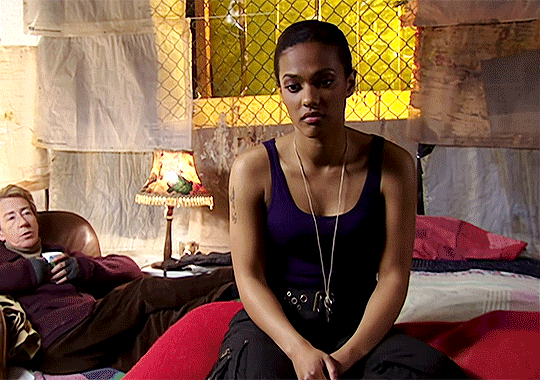
<- Intro
Chapter 2 ->
#martha jones#doctor who#doctor who fandom#dw fandom#tenth doctor#10th doctor#rose tyler#donna noble#rtd era#rtd critical#new who#the doctor#dr who fandom#amy pond#clara oswald#river song#black representation#fandom racism#fandom history#fandom analysis#fandom antiblackness#freema agyeman#antiblackness#rtd#rtd1#doctor who analysis#the runaway bride#doctor who series 3
120 notes
·
View notes
Text












#i'm making an analysis about the different things Kris could have said to Susie on Wednesday#I made this because “Good” is my personal favorite#kris#kris dr#kris dreemurr#kris deltarune#susie#susie deltarune#susie dr#utdr#dr#shameless plug#kind of#or maybe they just dropped the yo mamma joke of the century#who knows?#the inner mechanisms of their mind are an enigma#text boxes#noelle#noelle dr#noelle deltarune#noelle holiday#deltarune
93 notes
·
View notes
Text
"Theta Sigma," Analysis
Okay, vague background. Theta Sigma was the name the Doctor used when he attended the Academy on Gallifrey.
Theta and Sigma are both Greek letters and have some pretty intense symbolism in my opinion.
Uppercase theta was often used in Latin funerary inscriptions. Romans would often set up the funerary monument while the person was still alive, but if the person died beforehand, their names would be marked with an uppercase theta. Ennius, an ancient Roman author, is believed to have called Theta a "letter much unluckier than the others."
Sources from different Greek periods have interpreted theta as a sign of death. Classical Athens literally used uppercase theta as an abbreviation for Thanatos, the Greek God of Death. Isidore of Seville interpreted theta as one of the five mystic Greek letters, applied by judges to those who are given the death penalty. It is found on potsherds that ancient Athenians would use when voting on the death penalty.
Theta is also found in many forms of symbolism like many Greek letters, but I am using the above interpretation in my analysis.
Sigma, meanwhile, was held in high importance, appearing in architecture and coins. The word "sigma" is probably derived from the word "sig-jo" or "I hiss." Hissing is typically used by animals as a warning to predators. They hiss when they feel uncomfortable or frightened.
However, I'm sure people are more familiar with sigma in terms of mathematics. Uppercase sigma as the operator for summation, and lowercase as standard deviation of some population or probability distribution. It has also been used as a symbol for a ton of other fields from physics, chemistry, and biology to linguistics, accounting, and macroeconomics (but those meanings are more obscure in my opinion and will therefore be excluded from my analysis).
In any case, whenever I see Theta Sigma written out on audiobook cover (like in The Trial of the Valeyard) or in that stone River carved it into (in The Pandorica Opens), it is always the uppercase form. For that reason:
Theta: an unlucky letter; associated with death; a brand for criminals facing the death penalty
Sigma: hissing (a technique used by animals when frightened to ward off predators); an operator for summation
Considering all of this, it is an interesting name for the Doctor to go by in his youth. If the uppercase Theta was used to symbolize death in Latin funerary inscriptions and was used in Athens to vote on and brand those awaiting execution, the "Theta" part of the name seems to indicate that they are, well, associated with death and potentially awaiting execution.
But where did he get this name? Who started calling him it? Given the recent season, could it be possible that he was given that label by the Division? Considering what the CIA had Vansell up to in his youth (I'm not sure how the Division and the CIA relate to each other, but there probably is some link), I'm willing to bet that that name was given to him because of the foreknowledge of what the Doctor would do in the future or perhaps knowledge of what he's already done in the past.
And Sigma, can't forget that. The hissing a scared animal does to frighten off predators. The operator for summation. Could that represent, perhaps, some deep, core fear of the Division and of those who hurt the Doctor in their youth? Fear that they can't even remember because of the mind wipes? A summation of all the fear the Doctor has felt from those who experimented on them and hurt them and killed them, and that fear continues even to that day since his nickname itself is a brand marking him for execution at some point in his timeline (Two to Three anyone? Six's trial? Rassilon was ready to have Twelve killed once he was no longer in the controlled environment of the Confession Dial and still refusing to tell him what he wanted to know).
And what exactly would someone do if they were constantly being chased by death itself, if they were afraid of something but could not remember precisely why?
They would run away, and they would never, never stop.
#i am dramatically overthinking this#but i have thoughts and you will be subjected to them#theta sigma#doctor who#dw#classic who#dr who#new who#second doctor#first doctor#third doctor#sixth doctor#twelfth doctor#vansell#celestial intervention agency#the division#the timeless child#an analysis!#by an idiot#gallifreyan academy#academy era dw#doctor who academy era#academy era#rassilon#tecteun#river song#the pandorica opens#divided loyalties#hell bent#dw theories
28 notes
·
View notes
Text
Poison Ivy Reference In The Joker The Man Who Stopped Laughing

Matthew Rosenberg wrote this for me specifically.
#comics#comic books#joker the man who stopped laughing#issue 12#issue 6#dc#dc comics#jason todd#red hood#the joker#poison ivy#dr pamela isley#pamela lillian isley#jason peter todd#parallels#comic panels#character parallels#matthew rosenberg#g willow wilson#comic analysis#media analysis#media commentary#writing analysis#batman rogues#rogues gallery#batfamily#batfam#batkids#poison ivy 2022
68 notes
·
View notes
Text
This is intended as a loose, not-that-serious “generalization,” but I feel like you can sorta tell the age of a httyd fan based on how they react to Stoick’s relationship to Hiccup in the first movie.
Other life factors aside, someone young is more likely to side with Hiccup and relate to the ways that Hiccup feels uncomfortable with his father’s disappointments and expectations. They’re more likely to call Stoick unfair, perhaps even go so far as to say he was abusive.
Meanwhile, I feel like many adult fans understand and sympathize with Stoick. They understand the nuance and struggles of a parent trying to help your kid, steer them away from wrong and dangerous paths, appropriately call out and discipline bad behavior to protect them from worse consequences, puzzle over your kid’s seemingly contradictory claims, handle the weight of many stressors, and sometimes make mistakes, even big mistakes (it doesn’t make you a bad person, but, like every parent, imperfect).
I first saw HTTYD when I was in high school. I saw things from Hiccup’s view. Now I’m 30 and I see things from Stoick’s. I think that’s part of the magic of HTTYD - both father and son are relatably real, struggling through things an everyday father or son would. To say Stoick is an abusive parent is as inaccurately reductive as saying Hiccup is a menace. Stoick made a few poor and questionable remarks that hurt Hiccup, and Hiccup did wildly questionable, disobedient, reckless, and dangerous things that hurt or scared Stoick and the rest of the village. Both sides had blind spots for how the other felt that exacerbated the other’s stress. I love that HTTYD understands both sides made mistakes, both sides are intended well, and both sides struggle with miscommunications.
I love that HTTYD didn’t reduce either Hiccup or Stoick in depicting a miscommunicating, on-the-opposite-side-of-the-coin, still-love-each-other family.
#tl;dr the 'stoick is abusive' arguments come out of skewed perspectives#of someone who may have had a horrible childhood growing up and see Stoick through that painful (and understandabl#e) filter#or someone who is still young and relates to the frustration of restrictions their parents enact currently upon them#whereas when you get older you watch Hiccup and go#'hehhhh..... yeah he's making young idiot teenager mistakes good gollyawhoopsidoo'#'I would be up to ten thousand headaches in Stoick's spot and struggling hard how to handle it'#to be clear: abuse isn't about intention - but to call something as basic as this struggle 'abuse'#is to conflate a charley horse with a broken leg#say that their relationship is strained - not 'abusive' - not everything that isn't perfect that hurts someone is abusive#httyd#How to Train Your Dragon#analysis#httyd analysis#my analysis#Haddock family#Stoick#Hiccup
225 notes
·
View notes